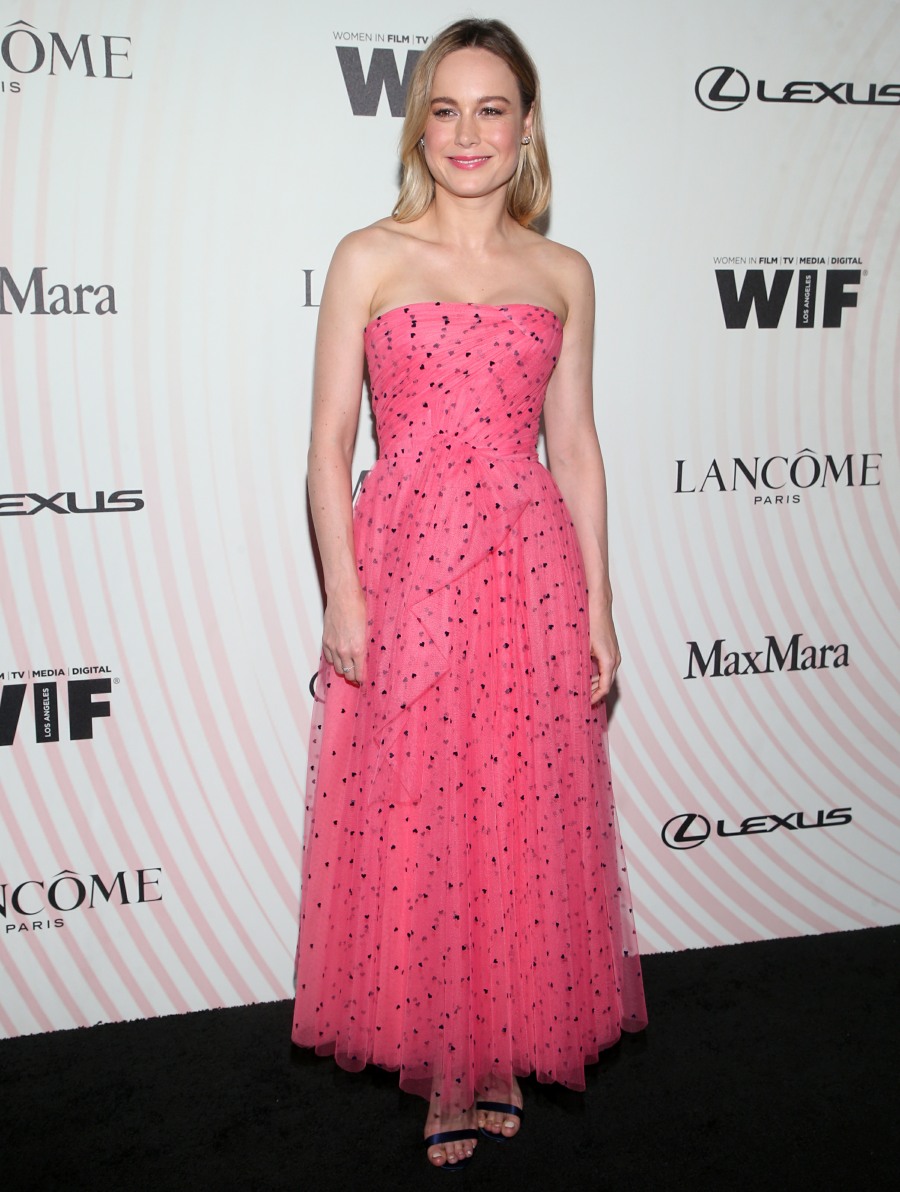A few years ago, Meryl Streep was getting a lot of well-deserved flak for saying a lot of dumb crap about feminism and whether or not she considered herself a feminist. In the midst of that conversation, Meryl brought up a sidebar conversation about how there should be more female film critics. Coming in the midst of her general dumbassery about feminism, I think a lot of people either ignored what she said or just forgot about it. But she had a point. And it’s a point that Brie Larson made at the Women in Film Crystal + Lucy Awards on Wednesday. The point being: until female filmmakers, female writers and female-driven films get a fair shake from film critics, those stories will continue to be erased by Hollywood.
At the Women in Film Crystal + Lucy Awards in Beverly Hills on Wednesday night, Brie Larson advocated for more inclusive film criticism. Referencing data from USC’s Annenberg Inclusion Initiative, Larson reported that 80 percent of film critics who reviewed 2017’s top box-office hits were male. Larson used A Wrinkle in Time as an example of this lack of parity’s effects: “I don’t need a 40-year-old white dude to tell me what didn’t work about A Wrinkle in Time. It wasn’t made for him! I want to know what it meant to women of color, biracial women, to teen women of color,” she said. “Am I saying I hate white dudes? No, I am not. What I am saying is if you make a movie that is a love letter to women of color, there is an insanely low chance a woman of color will have a chance to see your movie, and review your movie.”
Larson asked for studios to screen movies for critics from underrepresented backgrounds, and to include them in press junkets. “It really sucks that reviews matter — but reviews matter. Good reviews out of festivals give small, independent films a fighting chance to be bought and seen. Good reviews help films gross money, good reviews slingshot films into awards contenders,” she said. “A good review can change your life. It changed mine.”
Brie is right (just as Meryl was right). This was one of the ways in which the late, great Roger Ebert excelled though, not to get all #NotAllWhiteDudes on everyone, but Ebert always took into account whether a film was targeted for a certain demographic, and Ebert was always very inclusive in how he viewed films and filmmakers. God, how I miss Ebert. Because most of the critics these days ARE white bros who just get hard for Marvel movies and very little else.
Every year, I try to see all of the Best Picture contenders, the films which are the best-reviewed of the year, the creme de la creme of what Hollywood has to offer… and I’m still shocked that some of these problematic and awful films get nominated. I was just thinking the other day: “Isn’t it weird that they gave Gary Oldman the Oscar for that absolutely terrible film about Churchill?” That happened just this year!!! One of the best-reviewed films of the year, a film that got its lead actor an Oscar, was a boring and tedious turd of a film which glorified the decisions of powerful white men. I felt the similarly to seeing Casey Affleck win his Oscar for that grief-p0rn bullsh-t Manchester By the Sea. But both of those films were beloved by the white dudes in charge of declaring what movies are good and which are bad. Time’s Up!
Photos courtesy of WENN.
















100% agreed and I do love her dress. Looking fierce while dropping truth bombs!
I love her dress even more than you do!
“I don’t need a 40-year-old white dude to tell me what didn’t work about A Wrinkle in Time. It wasn’t made for him! ”
But movies are generally made for everyone, for general audiences. Especially if they are fantasy family adventure movies or sci-fi or smh. That includes 40-year-old white dudes too. Saying they shouldn’t review such movies, cause these critics are of certain age or skin colour, is kinda dumb.
The point is that because middle-aged white men control so much society on every level – economic, cultural, political, etc. – we’ve come to accept their vision and experiences as the default, whereas everybody else’s story gets relegated to the “Other.” That’s the problem. It’s not that 40-year-old aren’t part of the audience, it’s the fact that they’ve been convinced that they’re the only audience that matters. They can review those movies, but they need to be self-aware of how their personal privilege may influence how the story speaks to them.
There is a difference between “white dude critics can watch and review those movies, but need to be self-aware about themselves and all” and “those movies are not for you, you white dudes of certain age, so don’t review them cause we don’t need your opinion”. You offered the first approach , while Larson kinda offered the second approach (it sounded like that).
You’re right, Veronica.
Somehow white male researches often score anything that is not focused on them lower. I prefer to read opinions from others.
Brie repeatedly referenced the imbalance, not the fact that white male reviewers exist. It was the imbalance that she was objecting to. She pointed out that 80% of reviewers are male. She pointed out that there is an “insanely low chance” that a person of color would get to review the movie.
She wasn’t saying white males shouldn’t review movies, she was saying they should be the ONLY people writing the reviews.
Completely and utterly not her point.
Movies aren’t really made for everyone though, lots of different genres that are geared towards certain demographics. That’s why there’s a rating system too. A wrinkle in time was made for fans of the books and kids, young adults, not for 40 year old white dudes. That’s what she’s saying.
No they aren’t made for “everyone” but when you spend $100 million on a movie, you need a good portion of “everyone” to show up or you end up losing a horrific amount of money like poor Wrinkle in Time. There’s a reason why movies at that level budget are usually quite generic and “safe”. You need “everyone” to go see it. I think the hope may be that more diverse film critics can expand people’s minds as to what is “generic” and the default.
Movies are generally made for males in their twenties. I believe that is the target audience. Hence, the high number of franchise action and comic strip films.
That’s an interesting point. Shouldn’t art be universal? Are we really severed from other communities/genders sensibilities that we can’t evaluate a film from a person of another culture?
Like we need a lot of training to improvise, we need a lot of listening to be able to put ourselves in other people’s shoes and abstract what’s universal from what is local/specific.
My husband and I talk a lot about our gendered perspective on art and we have learned a lot from each other. I am sure there is a lot to learn from a female / lesbian / bisexual / asexual /WOC / queer perspective when it comes to art.
And THEN we can evaluate with a clearer perspective.
Like, I am sure all women can evaluate much better how a film is significant for straight men because that is the basis upon which our culture was built.
It’s a nice idea to think that art transcends racism and sexism but it doesn’t. And we should stop sugarcoating it.
They can review movies. They just can’t be the only ones with the power to review them. They’re in the majority.
Like everyone else, they have blind spots and their critiques, unless they acknowledge those blind spots, will be riddled with them. After reading her perspective, I now also understand why movies about middle-aged men going through mid-life crises seem to run so resonant and are well-reviewed by 40 year old white males who are critics. I forgot they’re the ones writing the majority of reviews. There are so many movies about that type of thing that are so well-reviewed, and I’ll just be like “huh. why?” I guess that would also explain the fascination with every actress under 25 and why movies starring 13 year olds who make 30 year olds feel special about themselves seem to be fairly popular despite making no bank at the box office.
One of the things that always stuck with me in the 90s was when Siskel and Ebert reviewed “Silence of the Lambs.” Everyone was falling all over themselves about how great it was, but Siskel was bold and insightful enough to comment on his frustration with the latest trend of “female suffering” media, which really took off in the years following women’s lib and pointed to a shocking violent backlash against women’s rights. Ebert didn’t quite agree with him that SotL was a specific case of violence porn, but it was one of the few places on television where you could find that kind of intelligent, respectful dialogue. And while those two certainly represented a pretty hefty level of privilege, themselves – educated, wealthy white men – they brought a thoughtful self-awareness to their reviews, which seems disturbingly less common these days.
Which is a long-winded way of saying I agree with Brie. But more importantly, what we really need is more MINORITY women behind the camera. The Trump era is unfortunately revealing to us that white women have benefited just enough under white patriarchy to lack the self-awareness of their precipitous position in the social hierarchy. It’s the long-silenced voices that need more resources.
IA that Siskel and Ebert set a high bar for understanding films — they brought deep knowledge of film history, passionate and broad film fandoms, and personal worldviews that were feminist and inclusive of different ethnicity’s experiences and viewpoints. Film was becoming more global in the 90s, there were tons of Asian films getting screened here, Mexican filmmakers were breaking through, Spike Lee was ushering in a new gen of Black filmmaking — Siskel and Ebert reviewed these types of films alongside the H’wood blockbusters and helped lots of small, ethnic, and foreign films get seen. Growing up, I really thought that was where culture was headed — Siskel and Ebert seemed to be the white guys who “got it” when it came to reviewing films about women, African Americans, and other groups. But nope. IA with Brie Larson. Film criticism needs to diversify as a profession. AND the white guys who are film critics need to aspire to be more like S&E.
As a woman of color, I appreciate this perspective. What saddens me, however, (I was just having this conversation with a friend who is white) is that in order for those people in power to even hear this conversation is that it has to come from someone White. If I say something, I’m an angry black woman, racist or sexist because I’m talking about racism or sexism, or I am just playing the race card. It’s infuriating to know that the people needing to be heard cant be because we are some how exploiting it.
I agree !
Yup! The moment we as black women or WOC point out any of this it’s immediately either shut down or filed under “just another angry black woman”. It’s unfortunate, but it’s why white allies – REAL – white allies are needed. Ava Duvernay said the same thing. Response? Crickets. Brie Larson says it and it gets its own article
👏🏾👏🏾👏🏾
Yes. It sucks. And even this message coming from a white woman with a platform won’t mean much unless someone in the position of power publish criticism (i.e. a white man) hears her and makes the change. But probably the majority of people in a position to provide a platform to these voices see this statement as angry, man-hating feminism.
I LOVE her dress. I have to say the more Brie Larson talks the more I like her. And it’s usually the opposite with actors lately. She seems to actually “get” it and isn’t about fake wokeness but ACTUAL wokeness.
Black people have been saying this forever why is it only being covered when a white woman says it?
Exactly. Meryl wasnt the first or even last person to say this. Neither is Brie Im glad Brie said something and I like her – she’s a real one. But it’s frustrating to watch black women be ignored and white women get applause for saying the same thing we’ve been saying for literally years.
To address this very problem, Miranda Bailey and Rebecca Odes started an email blast called Cherry Picks. Somehow I was approached to be on this email list, which features interviews with female film critics about movies — their picks for what they like right now, hidden gems, etc. — at a site called Cherry Bites.
Here’s a link to subscribe:
https://cherrypicksreviews.us17.list-manage.com/subscribe?u=c49bee6518a8a2765354c020e&id=ccb7e0ba51
Don’t shoot me, I like I Feel Pretty by Amy Schumer, but it got eviscerated by critics, and I think it was too harsh.
The films with higher ratings baffled me on Rotten Tomatoes. Same with other rom-coms, there can be a lot of hate.
What does that have to do with WOC and POC being represented within the critic community??
The article is also about there being more female critics
@Alyse this piece is about what Brie said. Which in her quote she is speaking specifically about representation for WOC.
It just makes sense to have more representation in critiques in general. Oftentimes, unless you take the time and effort to research the subject matter (which I doubt a reviewer would do for EVERY movie she/he didn’t immediately get), there are just certain links, jokes, imagery, themes, etc you’re just not gonna understand if you don’t have a personal attachment to the movie. At the very least be aware of your biases when you’re writing.
Anyway if film critics choose to stay stuck in their old habits then the Academy awards will start to go the way of the Grammys in that they’ll both be overly long shows that snub talent in favor of the safe old choices which will make them lose out on their bottom line.
Her premise over all is a strong one, but one part of this issue is artistic and one is business:
Artistically it is true that “female centric” films are being devalued and “white men overcome!” films are being overvalued. More diverse film criticism would definitely help. Make a point to seek it out where possible and drive reader traffic that way.
However;
Wrinkle in Time cost $100 million to make. It is a HUGE bomb financially. Massive money loser. A business failure. So I think it’s wonderful if young women of colour respond positively and enjoy the movie; but if you are going to spend $100 million (not including marketing!) you have to sell to all quadrants. So if only young women of colour like your movie? You cannot spend $100 million. Maybe if film critics were more diverse they could have driven audiences to it with their takes. I just don’t know. The age of the “too big too fail” movie has little fairness.
You have to start young. I took my nephew and my (male) cousin to go see Ocean’s 8 with me. They are 9 and 10 and they like heist films like that. I talked with them about the film afterwards, the plot, etc and asked them if they liked it. Both said blegh on the jewelry parts, but overall they liked it. They understood the plot for the most part and didn’t particularly care that they were all female leads; they just don’t like anything “romantic” i.e. kissing. When I took them to go see Black Panther, they LOUDLY said “ewww” when T’Challa and Nakia kissed. So I try my best to take them to female centric films that I think will interest them, and especially multicultural films, as my cousin is white and my nephew and I are biracial.
“Wrinkle in time” bombed at BO and has only 30% audience rating on RT. So it wasn’t only criticis who generally didn’t care for movie, it was also general audiences.
I wonder how much RT represents the general public. Guessing that a disproportianate amount of the people scoring there is white and male.
Not to mention the alt-right often giving bad reviews to movies that are focussing on women or POC. They even made a campaign of it with The Last Jedi.
Lol, Last Jedi got such low audiences ratings because the plot of the movie was really awful, barely connected to developments in TFA and destroyed the beloved and iconic character of Luke Skywalker. People hated it. TFA also concentrated on Rey (woman) and Finn (POC) btw, yet audiences loved TFA. It has 87% audience score.
So yes RT represents general public pretty well. Public simply didn’t care a lot for WIT and that’s the tea, and no it’s not critics’ fault.
I totally agree with Brie. The love for dick flicks like Braveheart and The Revenant astonish me, but it’s mainly coming from old white dudes who love movies about men being “manly” and find women’s stories less important and less interesting. Same can be said for “white, straight, cis-gendered” stories vs stories of underrepresented groups.
There is so much love for dick flicks probably cause lots of women like such films too. I mean I for example like old movie Predator about alien hunting humans. It’s a major dick flick about men being manly and sweaty in jungle. Still love it.
We also have a president who is an old white dude. He loves military trappings and “manly shows of strength—as long as he doesn’t have to get off his plump derrière to do anything.
Wrinkle in Time might not have been the best example for this. It does immediately bring to mind conversations when Beyonce released Lemonade.
ETO, it’s very bad example in fact. Also there are examples of movies which were penned by critics yet regardless of the reviews they were box office hits and liked by the audience. Audiences are not THAT governed by critics’ reviews.
I didn’t see Wrinkle in Time – my 20 year old daughter however (who had read the book and loved it) went to see it with her college friends, who include some African American young women (who also had read the book). None of them liked the movie. I asked her why and she said – the book is magical – the movie is a mess (and not much like the book). So maybe it didn’t do well because it was not a very good movie?
“So maybe it didn’t do well because it was not a very good movie?”
Yes that’s is part of it. I thought it was a terrible movie to be honest. One or two saving graces among the actors but overall poorly shot and very dull.
But on the other hand most of the Transformers sequels have been absolutely terrible and made ten times as much. So it’s complicated.
Transformers movies are all about CGI giant robots which fight. Nothing else. That’s why sequels did well.
I mean, we see it year after year as primarily white men rave/complain about movies at festivals only for a more diverse critical/general audience to have a different reaction. I loved it when Jessica Chastain served on the Cannes jury and called the filmmakers out on their portrayal of women in film. That’s something that rarely occurs with mainstream white male film critiques unless the mistreatment is blatant.
This also brings to mind the trajectory of Three Billboards last year. If advance press for a film is done by critiques who are willing to ignore blarring issues of race in a film and the treatment of that, then yes, it’s going to seem like backlash when a more diverse audience sees the film and notices the things that you were blind to.
“It wasn’t made for him!”
Incredibles 2 wasn’t made for them either, yet they’re giving that movie good reviews. Same with Ocean’s 8. Same with Get Out.
A Wrinkle in Time was awful. Blaming the bad reviews on white dudes not getting it is ridiculous.
God, I love her dress here.
Also, I don’t even remember that Churchill movie happening.
||But both of those films were beloved by the white dudes in charge of declaring what movies are good and which are bad.||
The thing is – in this conversation which is going on here about movies and critics, it matters not only if the critics like the movies or not, but if people care enough to go and pay to see them as well. Judging by the BO data neither of them flopped at BO and they made profit. Though neither of them was light entertainment movie.
Now, another movie which was brought up here, Wrinkle in Time, it bombed badly, though it was a science fantasy adventure film, and thus it had a bigger entertainment appeal. I don’t see how it’s critics’ fault that it bombed if people didn’t want to go and pay to see it.
Darkest Hour was far from one of the best reviewed films of last year. It got an 85% on Rotten Tomatoes, but if you read the reviews most critics thought it was a deeply mediocre piece of filmmaking. Not so bad they judged it rotten, but very, very average.
As I see Darkest Houst did make it into the List of Top Best Reviewed Movies on Rotten Tomatoes of the last year (aka Top Movies of 2017) so maybe that’s what was meant by OP. All movies from that list probably qualify as “one of the best-reviewed films of the year”.